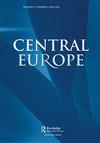从铁幕到佛朗哥统治下的西班牙:流亡中的右翼中欧人
IF 0.1
2区 历史学
Q2 HISTORY
引用次数: 2
摘要
第二次世界大战后,来自中欧和东欧国家的不同背景的反共主义者决定在佛朗哥统治下的西班牙定居,在那里他们寻求安全和生活的地方。本文将概述他们的政治概况,并评估这些流亡者选择西班牙的原因,这个国家直到1955年才被排除在联合国之外,由弗朗西斯科·佛朗哥领导。这篇文章还展示了他们如何在与纳粹和意大利法西斯有关的独裁统治中安定下来,以及他们如何利用公共和私人资源继续与共产主义作斗争。本文章由计算机程序翻译,如有差异,请以英文原文为准。
From The Iron Curtain to Franco’s Spain: Right-Wing Central Europeans in Exile
ABSTRACT After the Second World War, anti-communists of different backgrounds from Central and Eastern European countries decided to settle in Franco’s Spain, where they sought safety and a place to live during the Cold War. This article will provide an overview of their political profiles and assess the reasons these exiles chose Spain, a country excluded from the United Nations until 1955 and led by Francisco Franco. The article also shows how they settled in the dictatorship linked to the Nazis and Italian Fascists, and the ways in which they continued their struggles against Communism with public and private resources.
求助全文
通过发布文献求助,成功后即可免费获取论文全文。
去求助
来源期刊

Central Europe
HISTORY-
CiteScore
0.20
自引率
0.00%
发文量
7
期刊介绍:
Central Europe publishes original research articles on the history, languages, literature, political culture, music, arts and society of those lands once part of the Habsburg Monarchy and Poland-Lithuania from the Middle Ages to the present. It also publishes discussion papers, marginalia, book, archive, exhibition, music and film reviews. Central Europe has been established as a refereed journal to foster the worldwide study of the area and to provide a forum for the academic discussion of Central European life and institutions. From time to time an issue will be devoted to a particular theme, based on a selection of papers presented at an international conference or seminar series.
 求助内容:
求助内容: 应助结果提醒方式:
应助结果提醒方式:


